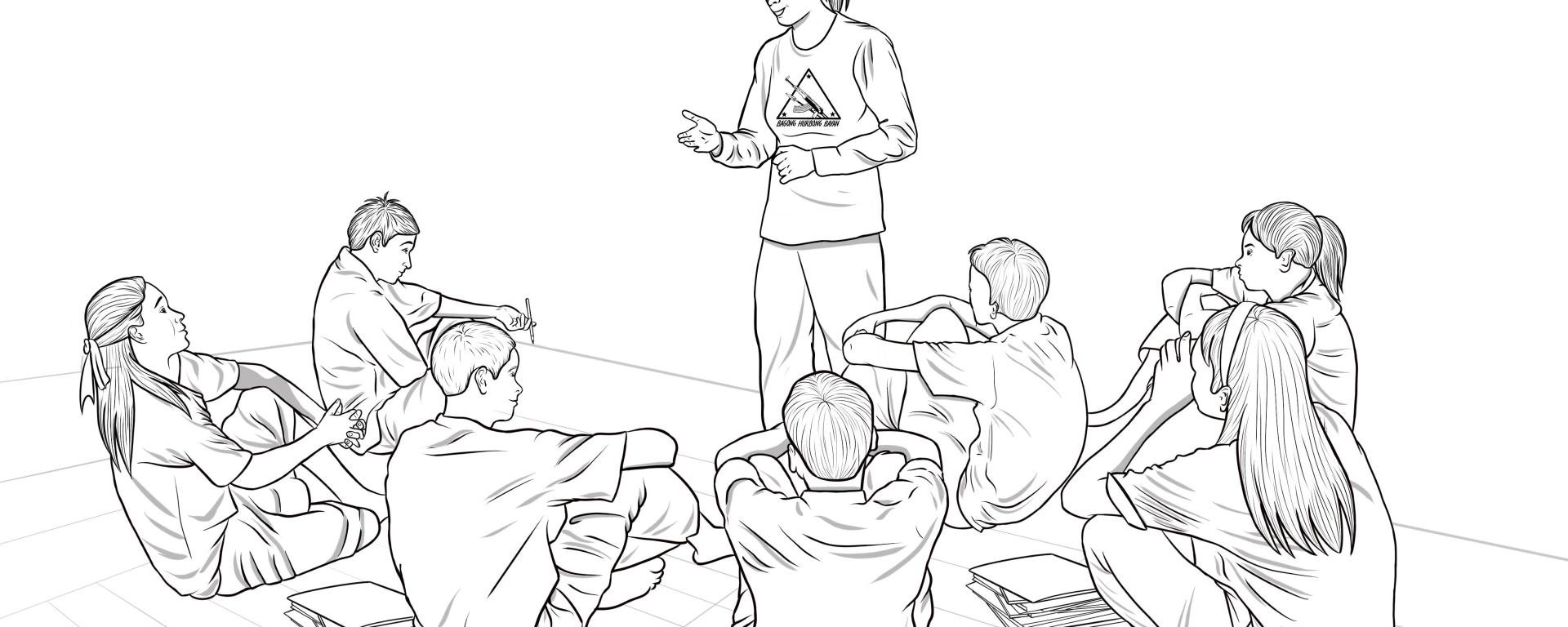
A number of Red fighters have taken on teaching responsibilities in the countryside after the Department of Education implemented the blended learning mode in 2020. Ka Agnes, a teacher and New People’s Army member, was one of those who shouldered the task.
“When I was younger, I was amazed how my teachers taught two grade levels at a time,” she said. “I never thought I’d be doing the same thing.” In her area of responsibility, Ka Agnes taught students in four grades in “all subjects, lessons and topics.”
Many parents don’t have the time, patience or knowledge to teach. She heard mothers gripe about how they have long forgotten school lessons, or how that they are too busy and do not have the time to teach. “I did not graduate,” a mother told her. “That’s why I’m sending the kids to school.”
Ka Agnes narrates that before their unit arrived in the area and comrades were not yet available for teaching, kids looked up answers for their modules from an app. “I was surprised when I read the answers,” she said. “Not all are correct! And children were just concerned with the answers, not with the process or solutions on how to come up with answers for their modules. All they did was copy.”
Ka Agnes saw grave errors in the modules and even in the weekly exams. “There were errors in the conjugation of verbs, errors in tenses, choice of words, and examples,” she lamented. “The worst was when the lessons themselves were wrong.”
As a teacher herself, Ka Agnes can relate to the difficulties that teachers have to endure under the blended learning mode. Compared to in-person teaching, she knows how hard and costly it is to prepare and print modules and grade voluminous modules dumped on them, not knowing whether it was answered by the student or his or her mother. “It’s hard to evaluate a student’s level of understanding if you don’t see them face-to-face,” she said. “You won’t know who to award the First Honors for high marks, the student or the mother?”
In her experience, blended learning is a failure and no amount of adjustment can save it. “If you ask me if children learn effectively from this, I’d say no.”
Homes in the countryside are comfortable not for learning but for doing other things. “The house set-up is too different, there is no pressure, life is a breeze.” She said that when schools were open, children would long for Fridays and free weekends. “Now, they pray that Friday won’t come because they need to turn in their modules and they haven’t gotten to them despite having been given a whole week.”
Since they don’t physically go to school, children have lost the ability to keep time—from waking up to preparing to go to the hourly shifts of lessons which conditions them to listen to a teacher for a specific period. Under in-person learning, even exams are conducted within a set time frame.
“They no longer acquire the discipline of learning that comes from the discipline of keeping time,” Ka Agnes lamented.
Many children also choose to work instead of doing their lessons. “Momoy, a student of mine who is in Grade 9, chose to work in a furniture shop rather than work on his modules.” She can’t fault the child since his family really needs the added income.
So many things can get in the way of doing the modules. “Once they get distracted by their Android cellphones, for sure they’ll be at it for the rest of the day,” she said. “The modules will be left gathering dust in a corner.”
Worse, Ka Agnes observed, the blended learning mode has bred conditions where young minds deteriorated due to online gaming and activities. This is the result of unsupervised internet use, something that children had limited access to when they were in school.
“They race to improve their ranking in online games, rather than work for the honor of learning.”
Unregulated gaming has changed the children’s physical and social environment. They often neglect their health when playing online. They no longer get out of their homes and their bases for forming friendships changed. Their emotional and mental health is damaged. “They isolate themselves in their rooms and their emotions veer wildly with the things they see on the internet.”
Ka Agnes understands that parents and adults have a crucial role in supervising and regulating gadget use. But in many cases, adults are too busy working so they can feed their families amid widespread destruction of jobs due to the state’s failed response to the pandemic.
“When all is said and done, we circle back to the failed semicolonial and semifeudal system,” Ka Agnes said. “This rotten system is also rotting children’s minds. This is precisely what the people’s democratic revolution is fighting against and repudiating.”
She plans to shift lessons after the children are done with their quarterly modules. “I’m going to schedule a short course on Philippine society and revolution,” she said.
https://cppangbayan.wordpress.com/2022/03/07/doing-modules-npa-style/

No comments:
Post a Comment
Note: Only a member of this blog may post a comment.